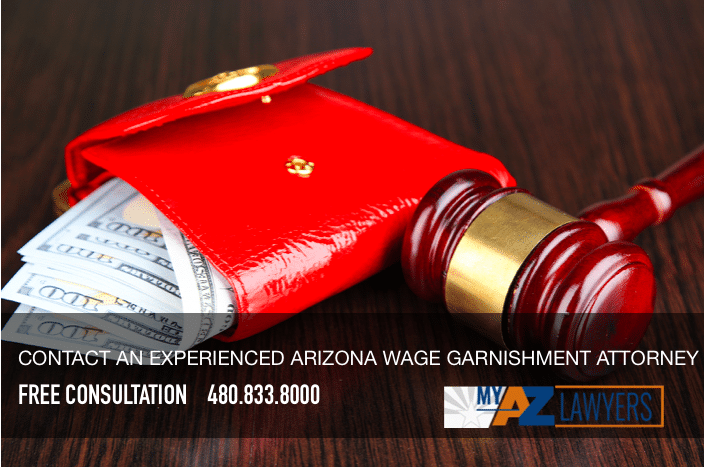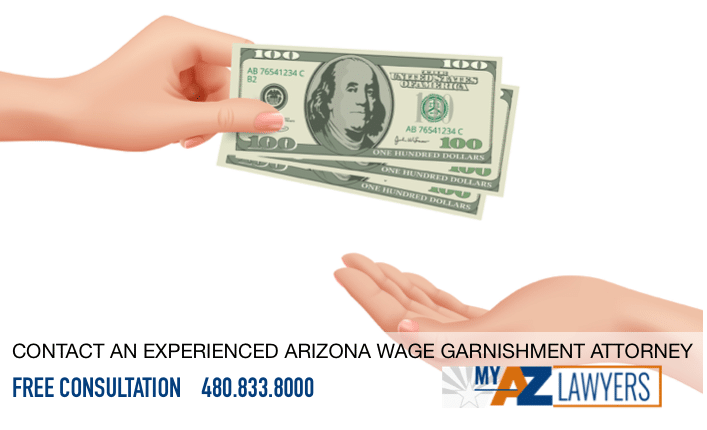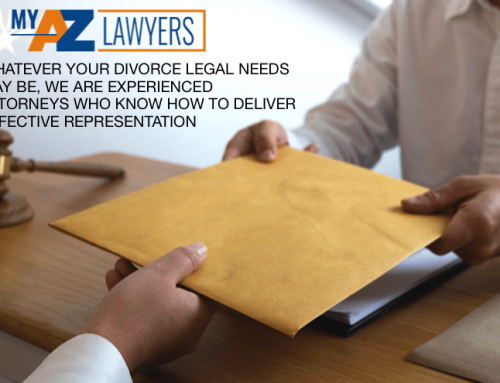Table Of Contents
Wage Garnishment 101
Wage Garnishment in Arizona. How It Works. What You Can Do.

Wage garnishment is many creditors’ preferred method of debt collection. Once your creditor has a wage garnishment against you, a standard percentage will be deducted from your wages each paycheck. Your creditor can garnish your wages once they have obtained a money judgment against you and you fail to pay the balance. At that point, the creditor will request an order to garnish your wages from the court, and have it served on you and your employer. Your employer is required by law to comply with the garnishment order.
Types of Wage Garnishment in Arizona
Almost any debt can eventually result in a wage garnishment. However, debts like credit cards, student loans, and domestic obligations can all be garnished at different rates. If your debt is to your bank, they may use a bank levy instead of a typical wage garnishment. Your bank will garnish funds directly from your bank account.
How Much of Your Wages Can Be Garnished?
Almost all debts, like personal loans, credit card debt, medical bills, and other consumer debts will be garnished at 25 percent. Federal debts, like student loans and taxes, can only be garnished at 15 percent. Domestic obligations, which include child support and spousal maintenance, can be garnished at a much higher rate. If you are financially supporting a spouse or another child, your wages can be garnished at 50 percent. If you aren’t, this increases to 60 percent. Once you fall 12 weeks behind on your payments, the garnishment can increase an additional 5 percent.
What Things Can Be Done if There Is a Garnishment Against You?

If you are being garnished for a standard 25% garnishment, you can petition the court to reduce the garnishment. You will need to prove that the garnishment is causing you a substantial hardship and you aren’t able to survive with the full garnishment being taken out of your paycheck. However, the lowest the court will reduce your garnishment to is 15 percent.
If you think the balance of the money judgment is incorrect, you can dispute the judgment. You must make this decision quickly because in most circumstances, you will only have 5 days to raise such an objection with the court. You can also raise an objection if you believe the judgment is being improperly executed or is violating state law in some other way.
If you are able to, paying the judgment in full will immediately stop the garnishment against you. A friend or family member may be able to lend you the money. Otherwise, bankruptcy remains as an option for those who have no other means to stop a wage garnishment.
Can Your Wages Be Garnished Without Notice to You?
Some debts, like student loans, back taxes, child support, and spousal maintenance, can be enforced without your creditor having to go through the formal judgment process. However, you still must be legally notified before the garnishment begins, along with your employer. The garnishment can begin within 5-30 days, depending on the applicable state law.
Why Is the Balance of Your Garnishment So High?
When you receive notification of an impending wage garnishment, you may be surprised at how high the balance is. Your creditor may add legal fees to your judgment that can significantly increase the balance. You may also be charged interest on the judgment, which can drag out the length of your garnishment even more.
Can More Than One Creditor Garnish Your Wages At Once?
Except for child support and spousal maintenance garnishments, no more than 25% of your wages can be garnished at one time. If you are being garnished for a debt such as your taxes or student loans at 15% and another creditor wants to garnish you as well. This creditor will be limited to garnishing your wages at 10 percent to avoid exceeding 25 percent until the garnishment for the first creditor ends. Creditors will wait in line to garnish your wages so that as soon as one debt is paid off, the next creditor will step in to garnish up to 25% of your wages.
Can My Employer Fire You If Your Wages Are Garnished?
Your employer may not legally terminate you for receiving a first wage garnishment. However, if your employer receives notice of a second or subsequent garnishment, that is legal grounds for your termination.
Using an Arizona Attorney to Avoid a Garnishment.
If you plan to dispute the wage garnishment or the judgment it stems from, you may want to hire an attorney to represent you in the matter. However, attorneys for this type of matter may charge by the hour, making it only feasible and worth the expense if the garnishment is for a particularly high judgment. If you want to stop a garnishment through bankruptcy, you can also hire an attorney for legal representation. An attorney can guide you through a Chapter 7 so it goes as smoothly as possible and you don’t have to surrender your assets, and is basically a must for Chapter 13- less than 1% of Chapter 13 cases that are filed without an attorney are discharged.
Can Filing Bankruptcy in Arizona Stop a Wage Garnishment?
From the moment you file a bankruptcy petition with the court, you are protected from garnishment, repossession, foreclosure, and utility shut offs by the Automatic Stay. The Automatic Stay will protect you until your case is discharged or dismissed, or if one of your creditors succeeds in a Motion for Relief from the Automatic Stay. Most individuals file their bankruptcies under either Chapter 7, which lasts 3-6 months, or Chapter 13, which lasts 3-5 years.
If the debt isn’t discharged in the bankruptcy, it will resume once the case is discharged. However, many types of debt that commonly result in a wage garnishment are dischargeable in bankruptcy. Credit cards, medical bills, personal loans, repossession deficiencies, and more will be wiped out by both chapters of bankruptcy. Therefore, if the debt for which you are being garnished is not the only debt you are struggling with, you should at least consider filing for bankruptcy. It will not only stop your wage garnishment, but eliminate other debts that could also result in garnishments in the future.
Don’t Delay if You are Facing a Wage Garnishment.
If you have received notice of a wage garnishment, the clock is ticking. Therefore, you may only have a matter of days to resolve the issue before a healthy portion of your wages is deducted from every paycheck. Thus, the sooner you contact an attorney, the sooner they can help you stop the garnishment.
Don’t let your garnishment start and lose wages that you don’t need to- call and schedule a consultation with one of our experienced attorneys today. (480) 833-8000. The call is free, so, the only thing you have to lose is a wage garnishment. Contact Your Arizona Lawyer for Wage Garnishments now, the clock is ticking.









